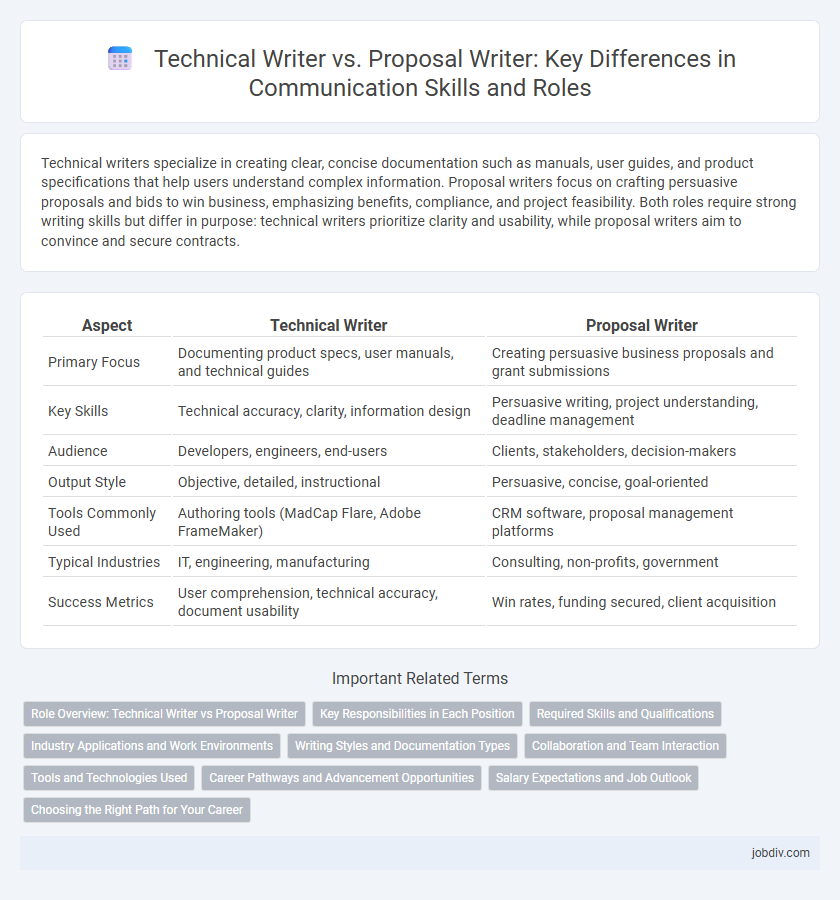Technical writers specialize in creating clear, concise documentation such as manuals, user guides, and product specifications that help users understand complex information. Proposal writers focus on crafting persuasive proposals and bids to win business, emphasizing benefits, compliance, and project feasibility. Both roles require strong writing skills but differ in purpose: technical writers prioritize clarity and usability, while proposal writers aim to convince and secure contracts.
Table of Comparison
| Aspect | Technical Writer | Proposal Writer |
|---|---|---|
| Primary Focus | Documenting product specs, user manuals, and technical guides | Creating persuasive business proposals and grant submissions |
| Key Skills | Technical accuracy, clarity, information design | Persuasive writing, project understanding, deadline management |
| Audience | Developers, engineers, end-users | Clients, stakeholders, decision-makers |
| Output Style | Objective, detailed, instructional | Persuasive, concise, goal-oriented |
| Tools Commonly Used | Authoring tools (MadCap Flare, Adobe FrameMaker) | CRM software, proposal management platforms |
| Typical Industries | IT, engineering, manufacturing | Consulting, non-profits, government |
| Success Metrics | User comprehension, technical accuracy, document usability | Win rates, funding secured, client acquisition |
Role Overview: Technical Writer vs Proposal Writer
Technical writers specialize in creating clear, concise documentation such as manuals, guides, and instructional materials aimed at helping users understand complex technical information. Proposal writers focus on crafting persuasive and structured documents designed to secure business opportunities by responding to solicitations, incorporating strategic messaging and compliance with client requirements. Both roles require strong writing skills but differ in purpose: one emphasizes clarity and usability, while the other prioritizes persuasion and winning contracts.
Key Responsibilities in Each Position
Technical writers specialize in creating clear, concise documentation such as user manuals, technical guides, and product specifications to facilitate end-user understanding and ensure product usability. Proposal writers focus on crafting persuasive documents, including bids, grant proposals, and business plans, aimed at securing contracts and funding by aligning solutions with client requirements. Both roles demand strong writing skills, but technical writers prioritize accuracy and clarity of complex information, while proposal writers emphasize persuasive storytelling and strategic communication.
Required Skills and Qualifications
Technical writers must possess strong skills in clear, concise documentation, proficiency with technical tools such as XML and content management systems, and a deep understanding of the subject matter to accurately translate complex information. Proposal writers require expertise in persuasive writing, project management, and knowledge of bid processes and compliance requirements to create compelling and compliant proposals. Both roles demand excellent research abilities, attention to detail, and the capacity to tailor content for specific audiences within technical and business environments.
Industry Applications and Work Environments
Technical writers primarily serve technology, engineering, and software industries, creating detailed manuals, user guides, and product documentation to ensure clarity and usability. Proposal writers typically work within sales, marketing, and business development sectors, crafting persuasive bids and grant proposals aimed at securing contracts and funding. Both roles demand strong communication skills but differ in focus, with technical writers emphasizing accuracy and instruction, while proposal writers prioritize persuasion and compliance with client requirements.
Writing Styles and Documentation Types
Technical writers specialize in creating clear, detailed manuals, user guides, and technical documentation aimed at helping users understand complex products or systems, emphasizing precision and clarity. Proposal writers focus on persuasive, structured documents such as business proposals and grant applications designed to convince stakeholders and secure funding or contracts, blending thorough research with strategic messaging. Writing styles differ as technical writing prioritizes objectivity and standardized formats, while proposal writing incorporates persuasive language and tailored content to meet specific audience needs.
Collaboration and Team Interaction
Technical writers facilitate seamless collaboration by translating complex information into clear documentation that aligns with engineering and product teams' needs. Proposal writers engage cross-functional departments to gather strategic input and integrate persuasive content tailored to client requirements. Both roles require dynamic communication skills and teamwork to ensure accuracy, coherence, and alignment with organizational goals.
Tools and Technologies Used
Technical writers primarily utilize tools like MadCap Flare, Adobe FrameMaker, and Microsoft Word for creating comprehensive manuals, guides, and documentation with structured content management systems such as DITA. Proposal writers often rely on collaboration platforms like Microsoft Teams, Adobe Acrobat, and proposal management software like Qvidian or RFPIO to streamline the development and submission of persuasive bid documents. Both roles increasingly incorporate cloud-based tools and version control systems such as Git to enhance real-time collaboration and ensure document accuracy.
Career Pathways and Advancement Opportunities
Technical writers often advance by specializing in complex documentation or moving into roles such as information architect or content strategist, leveraging deep technical knowledge. Proposal writers typically progress toward roles in business development or project management, capitalizing on skills in persuasive communication and strategic planning. Both career pathways offer advancement opportunities that depend on industry expertise, writing proficiency, and the ability to collaborate across multidisciplinary teams.
Salary Expectations and Job Outlook
Technical writers typically earn between $60,000 and $85,000 annually, with strong demand in industries like software, engineering, and healthcare. Proposal writers, often employed in government contracting and corporate sales, have salary ranges from $55,000 to $80,000 and benefit from steady growth driven by competitive bidding processes. Job outlook for both roles remains positive, but technical writing shows faster expansion due to increasing complexity in product documentation and digital communication needs.
Choosing the Right Path for Your Career
Technical writers specialize in creating clear, precise documentation such as manuals, user guides, and product specifications to support complex technologies. Proposal writers focus on crafting persuasive, strategic bids and business proposals aimed at winning contracts and funding opportunities. Choosing the right path depends on your strengths: technical writing suits those with a knack for detailed explanation and organization, while proposal writing favors individuals skilled in persuasive communication and project coordination.
Technical Writer vs Proposal Writer Infographic

 jobdiv.com
jobdiv.com